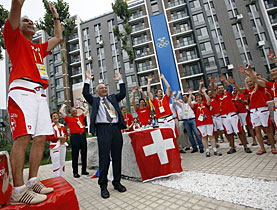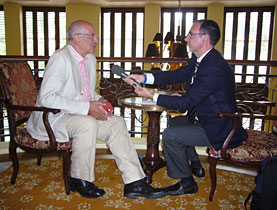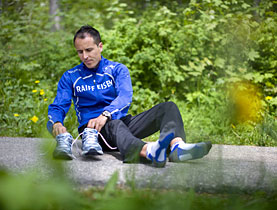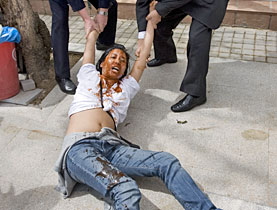Beijing prepares for fireworks

Four years after Switzerland won five Olympic medals in Athens, 84 primed athletes will be hoping to be faster, higher and stronger than 10,500 rivals in Beijing.
The much-discussed opening ceremony of the Games of the 29th Olympiad begins on Friday, August 8, at exactly 8.08pm in the Swiss-designed “Bird’s Nest” national stadium.
The number eight, considered lucky by the Chinese, will obviously work its magic on only a tiny percentage of athletes. But the hosts will be crossing their fingers that neither political protests, terrorist attacks nor doping or air pollution problems will upset the Games.
Attendance and non-attendance at the opening ceremony is a closely watched issue, as human rights groups have urged leaders to boycott the Games to protest against China’s crackdown in Tibet in May and its ties with the government in Sudan.
Who, for example, is the odd one out: Swiss President Pascal Couchepin, British Prime Minister Gordon Brown, German Chancellor Angela Merkel, UN Secretary-General Ban Ki-moon?
The answer, since I ask, is obviously Pascal Couchepin, who is the only one attending the opening ceremony. Pro-Tibetan organisations in Switzerland had collected 60,000 signatures calling on the Swiss president to boycott the ceremony.
“Switzerland is home to the headquarters of the International Olympic Committee and other international sports federations, so it is only natural that the Swiss president attend the opening of the games,” Couchepin explained.
He will not however be admiring the fireworks on his own – heads of state including US President George W. Bush, Russian Prime Minister Vladimir Putin and French President Nicolas Sarkozy will also be in the 90,000-seater stadium, designed by Swiss architects Herzog & de Meuron, on Friday night.
Couchepin met members of the Swiss Olympic delegation in the Olympic Village on Thursday and wished them good luck.
Ups and downs
The Swiss squad dwindled temporarily to 83 on Tuesday when road cyclist Michael Albasini fell in training and fractured his collarbone. However, on Wednesday Grégory Sarrasin was told he could compete in the 66kg wrestling competition after the Hungarians withdrew “for medical reasons”.
The first Swiss to see Olympic action in Beijing will be markswomen Irene Beyeler and Annick Marguet, who will take aim on Saturday morning at 8.30am local time.
But there are stars, there are superstars – and then there’s Roger Federer. The Swiss tennis world number one (for another ten days) could barely hear the questions at a media conference on Wednesday owing to the noise made by the phalanx of cameramen.
Federer, hoping for at least a silver lining to a cloudy year, was in a prickly mood at a practice session on Tuesday and then complained that constant attention from athletes had forced him to leave the Olympic Village.
“It’s impossible really, there are so many athletes asking for photos and so on. It’s not ideal to prepare,” he said.
Elsewhere Swiss canoeist Mike Kurt got a shock when a stone bore a football-sized hole in his hull during training. Fortunately the Swiss team’s trainer, Ludovic Boulesteix, who apparently used to build his own canoes when he was young, somehow plugged the gap.
Marcel Bürge, one of eight Swiss sharp shooters in Beijing, says working as a gun manufacturer when he’s not chasing medals is a double-edged sword. It’s obviously an advantage for keeping up with the latest technology, he says, but he also finds himself delivering his products to his international rivals…
People’s Olympics?
With the world’s eyes turned on Beijing, activists have stepped up their protests to publicise their causes. But public action is not limited to China.
On Thursday evening Swiss human rights organisations planned to light a “Candle 4 Tibet” in cities including Zurich, Basel and Bern. Candles will also be lit on the Piazza Grande at the Locarno Film Festival.
On Friday expatriates from Tibet and Myanmar will hold a minute’s silence outside the Olympic Museum in Lausanne. Organisers say they want to draw attention to the complicity of the Chinese government in human rights abuses in those countries.
Beijing has ramped up security ahead of the Games, with missile launchers guarding the main venues and a special 100,000-strong security force on the alert for terrorists.
Nor are all Beijing’s 15 million locals celebrating the Games, after thousands were forcibly evicted from their homes to make way for many of the venues and other modernising projects.
“I don’t feel much joy for the Olympic Games,” said one man, whose house was demolished in front of him late last year to make way for a car park just south of the main venue. “Isn’t this supposed to be a ‘People’s Olympics’?”
swissinfo with agencies
The 2008 Olympic Games will be hosted by China from August 8-24. The Paralympic Games will take place from September 6-17.
The Games will be centred in the Chinese capital, Beijing, with six other venues hosting certain events, including Hong Kong (equestrian) and Shanghai (football).
Some 10,708 athletes will compete in 302 events in 28 different sports. In the Paralympics 4,000 athletes will take part in 471 events encompassing 20 sports.
Participants appear in all shapes, sizes – and ages. The oldest competitor is the 67-year-old Japanese equestrian rider Hiroshi Hoketso; the youngest is Joyce Guedia Mouafo, a swimmer from Cameroon, who is a mere 12.
Eight-four Swiss athletes will be trying to improve on their performance in Athens in 2004, when the Swiss medal haul totalled one gold (fencing), one silver (cycling) and three bronze (cycling, triathlon, volleyball).
Speaking on the eve of the Games, the International Olympic Committee (IOC) said China had done everything “humanly possible” to combat air pollution, and conditions would be fine for athletes to compete.
Beijing’s polluted air has been a major concern since it won the bid for the Olympics in 2001. China spent SFr21 billion to go greener, doubling the number of subway lines and fitting factories with cleaner technology, but efforts were hindered by ongoing construction and growing traffic.
Beijing officials imposed strict measures in July, halving the number of vehicles on the streets, halting most construction and closing factories. They say there has been a 20% drop in major pollutants in July, compared with the same time last year.
On August 7, Beijing’s air pollution index was recorded at 96, close to exceeding the national level for acceptable air. Levels between 51-100 are considered moderate pollution, and anything over 100 is harmful to sensitive groups, such as the elderly.
Athletes have raised concerns from the start about the impact of the pollution on their health and their performance, with many choosing to train outside Beijing.
The IOC says outdoor endurance events, such as the marathon, could be postponed or rescheduled if smog levels are too high. The IOC will monitor the air quality on an hourly basis at 21 reporting stations and receive 72-hour weather forecasts. Rain and wind are now the only ways now to shift the haze.

In compliance with the JTI standards
More: SWI swissinfo.ch certified by the Journalism Trust Initiative



You can find an overview of ongoing debates with our journalists here . Please join us!
If you want to start a conversation about a topic raised in this article or want to report factual errors, email us at english@swissinfo.ch.